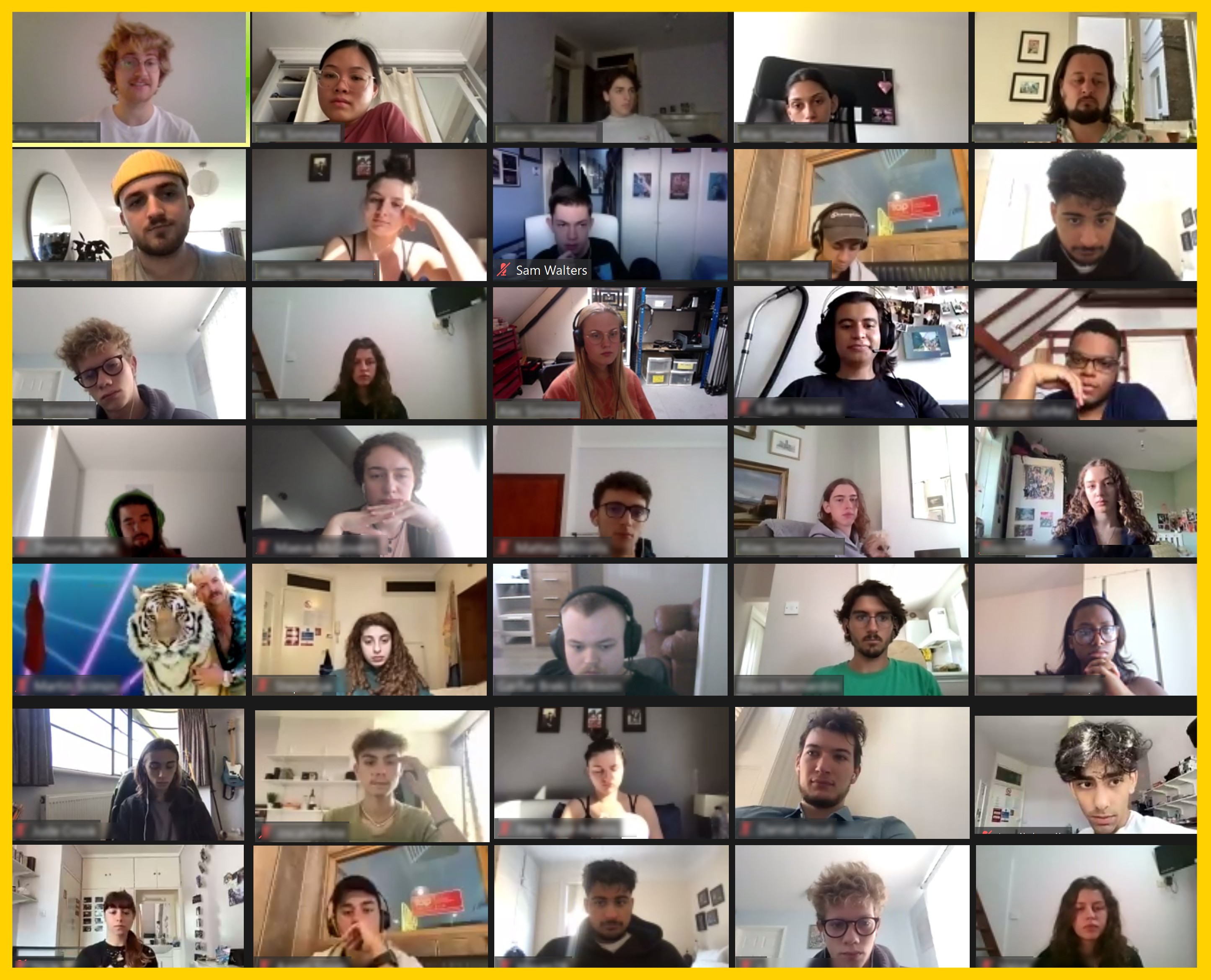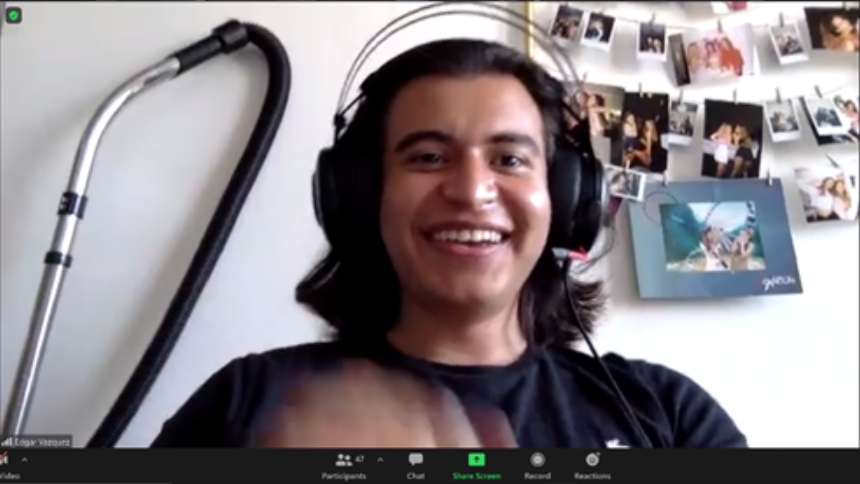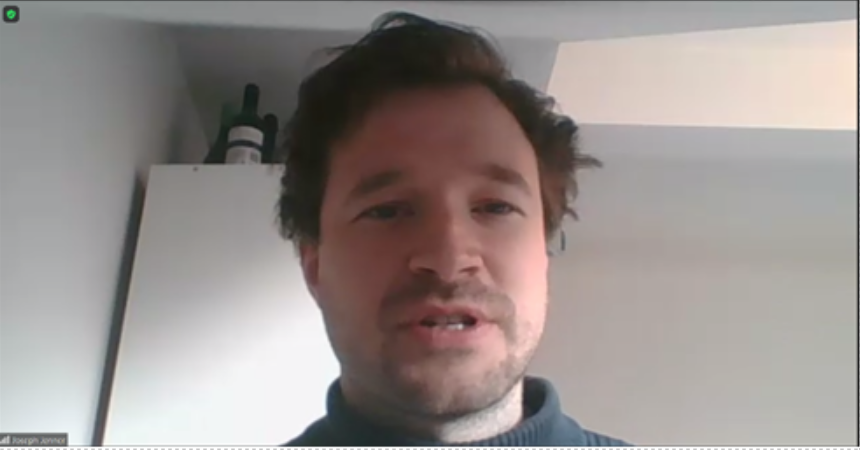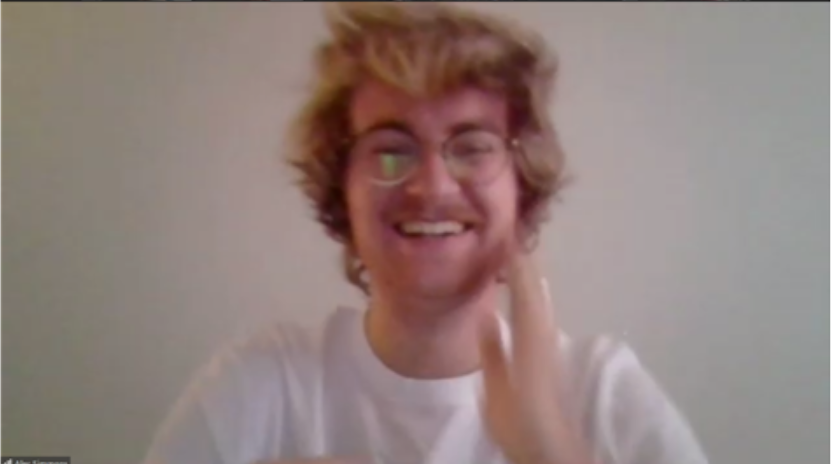It’s been a fun-filled week getting to know our new BA (Hons) Filmmaking cohort; they’re an energetic bunch, raring to go. As part of our jam-packed program of events, we hosted an advice-driven Zoom panel where recent BA graduates shared their top LFA stories, the journey they forged and the essentials of how to make the most out of their time studying.
Led by our wonderful BA Course Leader, the session covered all-important topics such as career progression, challenges they faced while studying and how to combat them, as well as how the students would have done things differently if they could relive their experiences.

Graduates Swaen, Juliette, Edgar and Alec offered such brilliant, constructive and insightful peer advice, we thought it needed to be shared for all to read. Take a look below at the excellent advice given by our LFA alumni, and let us know your thoughts.
A huge thank you to our graduates for taking part, our courses team for facilitating and our new BA students for their enthusiasm.
Q: How did the BA course help you figure out what you wanted to do in the film industry?
“The course itself helped me a lot in figuring out which role I was the most comfortable with. I found that producing suited me best because I love to be organized! Having the chance to try so many different roles is a good thing, to help you figure out what you want to do. If you’re secure and certain about the role you want, go for it, and don’t let anyone take it away from you.”
Edgar, LFA BA (Hons) Filmmaking Graduate

“If you don’t know exactly what you want to do, there’s no stress. I didn’t know what I wanted to do at the start. As I started doing the course, there was something about the camera department that really caught my eye. I loved the excitement of having to get the next shot rolling, and that really attracted me to camerawork.”
Alec, LFA BA (Hons) Filmmaking Graduate
“I didn’t know what I wanted to do in the film industry when I first started. I got into film through screenwriting, and I knew I loved photography, but I hadn’t thought about the option of being a cinematographer. I was interested in directing, but it also scared me a lot. Everyone gets to direct on the BA course, and so I found out that directing wasn’t my thing. I wanted to be in control visually, so I realized that what I wanted to try was cinematography.”
Swaen, LFA BA (Hons) Filmmaking Graduate
Q: What is the most challenging thing about being on the BA course, and how did it help you to grow?
“The toughest thing for me was dealing with the bigger personalities, and trying to find my voice amongst those personalities. For me, I feel like I have a naturally timid personality. So, when big personalities came in it was about learning how and when to say no to people, and to put your foot down, as well as also learning how to deal with people diplomatically.”
Alec, LFA BA (Hons) Filmmaking Graduate
“I agree with Alec; learning how to work with different people. On every project, the classes switch around, so you get to work with new people every time. Just trying to figure out, as a cinematographer, how to deal with different types of directors, and figure out the best way to work together creatively. That’s a real challenge. Try to find people on your course who you match with, creatively, really well. Find the people who align with your vision, 100%, because that’s valuable.”
Swaen, LFA BA (Hons) Filmmaking Graduate
“The work placement for me was a really great experience. I got on with my boss really well, and I got to work with one of my classmates from LFA. It was a great chance to get to know more about the role that I wanted to focus on. It helped me understand which industry I wanted to work in, and which type of people I wanted to work with at the beginning of my filmmaking career. The work placement option is challenging, but a really great option for the final term.”
Edgar, LFA BA (Hons) Filmmaking Graduate
“Collaboration is one of the best, and one of the most challenging, aspects of a filmmaking course. It’s super intensive, and very quickly you’re going to need to get to a point where you feel comfortable sharing your work and your ideas with your peers, and also take feedback from your peers. How do you negotiate creative disagreements? You will mature so quickly on this course, simply because you have to. These are really valuable life skills that you will take with you.”
Joseph, LFA BA Course Leader

Q: What are you doing now?
“I’m not exactly in the film industry, but I’m still in the creative industries, working as a design assistant in the fashion world. My advice would be to start working as much as you can when you’re doing the BA, without taking away from your education. Send out CVs, apply to internships, try to get your name known. Try to grow your portfolio, so that when you graduate, you’re ready to get jobs straight away.”
Juliette, LFA BA (Hons) Filmmaking Graduate
“As soon as we graduated, it was in the middle of lockdown, so it was really hard to find a job. Now that quarantine has ended, I’ve been bombarded with a lot of small-role jobs in different areas. At the same time, I’m directing two films at the moment. Signing up for the site Mandy.com was really helpful for me in getting paid work. The best thing to do is to learn about one role, get stuck into that specific role, and tell everybody who you know that that’s your thing. For example, I’m an AC, and whenever I go to parties or lunches, I tell everybody that I’m an AC, and that I’m committed to that thing. That way, people are more likely to contact you and recommend you when you have specialized in a specific role. They might say, ‘I need a really handsome, second AC’, and your name will be the first thing that comes into their mind! Most people aren’t looking for a director, they are directors looking for other roles. So, I always tell people I’m experienced in a specific role, even though I want to direct long term.”
Alec, LFA BA (Hons) Filmmaking Graduate
“I think that’s really great advice from Alec, that’s so true. So many people want to do every single role, but that’s really not how you will get jobs. You have to specialize, pick one thing. If you want to be a cinematographer, then it’s so important to pick one thing to start with.”
Swaen, LFA BA (Hons) Filmmaking Graduate
Q specifically to Swaen: How do you balance full-time work and personal projects?
“I’ve been told many times that working in a rental house, or any kit room, is really good prep for working in camera departments and as a DoP. It just helps you to grow in your technical knowledge, and work with new and different types of kits, to expand your knowledge of cameras and lights. That’s what I’m focusing on now, and then on the side I’m working on pre-production for another short film that I’m going to be working on with friends and colleagues from LFA. It’s tough, doing evening and weekend film work when you’re working full time, but I’m used to it by now.”
Swaen, LFA BA (Hons) Filmmaking Graduate
Q: What advice do you have for our new students as they start out?
“Buy books in your own time and really research your specialism to make sure you have an in-depth understanding of that role.”
Juliette, LFA BA (Hons) Filmmaking Graduate
“Really commit to every course, no matter what you’re doing. Even if you’re not interested in sound, give the sound classes 100%. That sounds cliché, but if you want to be a director, it’s so important to know all of the vocabulary in each different department, to communicate your ideas. Otherwise, you’re just left saying ‘I want energy, I need more energy!’, and no one in the crew knows what to do with that. So, pay attention in every course, so that you have that vocabulary. Even if you’re interested in cameras, still listen to the sound classes, so that you can work better with your crew and help give them what they need.”
Alec, LFA BA (Hons) Filmmaking Graduate

Q: What would you change if you did it all over again?
“The only thing I wish I could change is the pandemic!”
Edgar, LFA BA (Hons) Filmmaking Graduate
“Don’t be shy with actors, and don’t be shy to push your direction to the forefront. Words are so important. Say everything you want to say, and don’t hold back when you’re directing. It will help the film get to where you want it to be. You don’t want to watch your film back and regret not saying something or pushing something harder in the moment.”
Juliette, BA (Hons) Filmmaking Graduate
